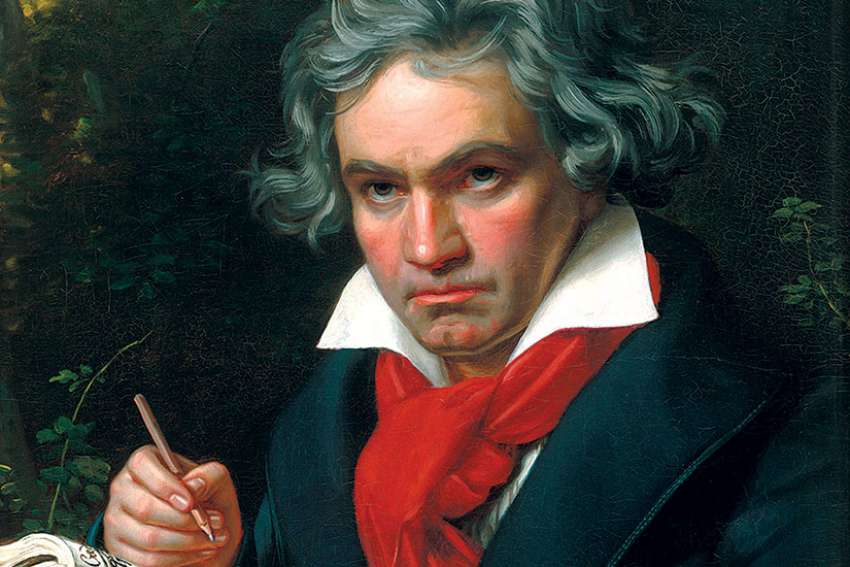“This beautiful Pastoral symphony is probably the most spring-like and hope-giving symphony, especially the first movement,” said maestro Uwe LIeflander, founder and director of Sacred Music Society and Beethoven buff. “It is probably the one work in all of music history that captures that essence to its most extreme, to its most tangible.”
The Toronto Symphony Orchestra is ushering in spring with renowned Finnish maestro Hannu Lintu’s interpretation of “Pastoral” on March 22-23.
In a way, Lieflander said, the Pastoral symphony is also a Lenten symphony because it tells a hidden story about how an 18th-century German composer transcended his life of suffering.
Beethoven is considered one of the most influential composers of classical music alongside Johann Sebastian Bach and Wolfgang Amadeus Mozart. His musical legacy, much of it built on religious foundations, is in stark contrast to the toll taken by his deafness, poor health and a dysfunctional family.
“Beethoven himself had a very miserable life,” said Lieflander. “His dad was a highly abusive drunk, a really nasty guy that tortured that poor kid…. He was also, in his life, besieged by sickness. He had a constant stomach ache and would often feel woozy and also came his deafness.”
Beethoven’s loss of hearing has been dated as early as 1801 at the age of 31 years old. As a result of his deafness, he often wrote down his conversations as a way to communicate with others. In these detailed notebooks, he also complained of abdominal pain, digestive trouble, chronic bronchitis and many other ailments.
His personal life was also in turmoil, even from an early age. Beethoven’s first music teacher was his father, who taught him piano and violin.
He later had other teachers, including a family friend named Tobias Friedrich Pfeiffer who would conduct late night sessions with a young Beethoven. It is said that Pfeiffer would often drag the boy from his bed to the keyboard.
Listen to a sample of Beethoven's Symphony N. 6 "Pastoral" here:
In March 1787, 17-year-old Beethoven travelled to Vienna, hoping to study with Mozart and establish his music career. However, his mother grew ill and he had to return home two weeks later. His mother died shortly after and his father lapsed deeper into alcoholism. As a result, Beethoven was left to care for his two younger brothers.
Beethoven eventually returned to Vienna in 1792 and was deemed as the musical successor to Mozart, who died just a year before. Still, illness and family difficulties followed.
In 1815, there was a drawn-out custody battle over his brother Carl’s son, after Beethoven deemed Carl’s wife Johanna was unfit to raise their nine-year-old son Karl. Beethoven developed an inflammatory fever during this time as well.
Despite his struggles, said Lieflander, his music always expressed beauty and joy.
“He didn’t write about his suffering, he transcended it,” he said. “That’s one of the big things about Beethoven. When you listen to, for example, the Pastoral symphony, you would have no idea that he was trying to kill himself.”
Lieflander also cited the joyous chorus of “Ode to Joy” that proclaimed words like, “Brüder, über’m Sternenzelt, muß ein lieber Vater wohnen.” (“Brothers, above the starry canopy there must dwell a loving Father.”)
Beethoven is credited for ushering a transition between the Classical and Romantic eras of music history. His most celebrated works include Für Elise, Ode to Joy (Symphony No. 9) and the Missa Solemnis (Solemn Mass), which he considered to be the “crown of his life’s work.”
Though he was born Catholic and maintained a close professional relationship with the Church, Beethoven’s own personal faith is elusive to say the least.
Many music historians consider Beethoven to be a child of the Enlightenment era. It is also well-known that many of his friends, like German opera composer Christian Gottlob Neefe, were members of a local chapter of the Order of the Illuminati.
Yet, his works expressed awe for God and His Creation. His most faithful patrons have been members of the Catholic Church.
Beethoven dedicated 14 compositions, including “Missa Solemnis,” to Rudolph Rainier, Archduke of Austria and Cardinal Archbishop of Olomouc. The Missa is deemed one of the greatest Catholic Masses of all time.
“Beethoven was assumed to have a very eschewed relationship with God,” said Lieflander. “Nonetheless, I am convinced as a conductor and musician that Beethoven is in Heaven…. God certainly used him as a vessel to spread a spark of hope to humanity and in that regard, one is hard pressed to imagine that God would condemn His vessel to hell, even though he was angry, and for good reason, with God for most of his life.”
Beethoven was bedridden for many months until he died on March 26, 1827 in Vienna at the age of 56. There is a story that in his final moments, Beethoven angrily shook his fist at the heavens.


